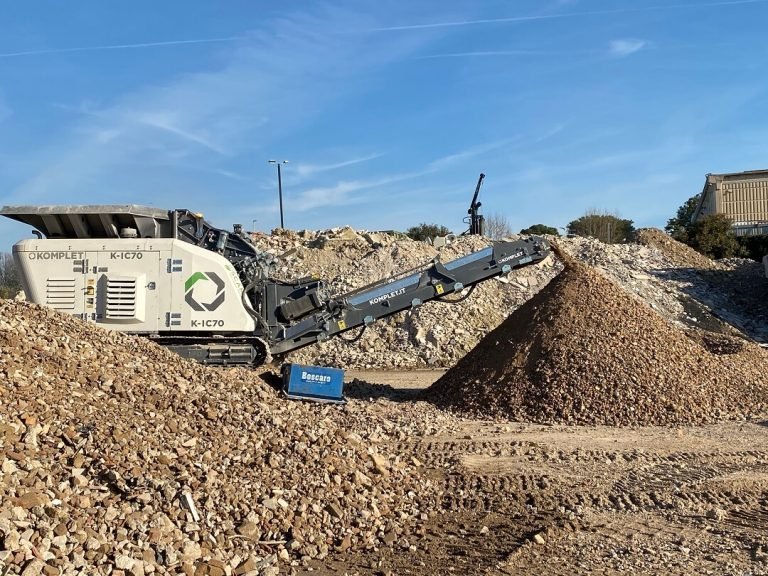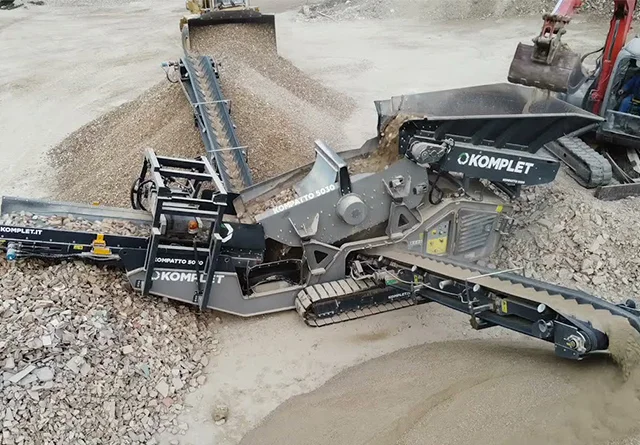
Mini Crushers vs. Traditional Crushers: Which is Best for Your Project?
What are the critical differences between mini and traditional crushers in construction and demolition? Learn which option offers the best cost, efficiency, and productivity balance.
Introduction
Mini crushers and traditional crushers play essential roles in demolition and material handling. However, with a wide range of sizes, functionalities, and capabilities, choosing the suitable crusher for your project can feel daunting.
Whether your focus is on efficiency, cost, or space-saving, understanding the differences between mini crushers and traditional crushers can help determine which machine best meets your project needs.
What is a Mini Crusher?
As the name suggests, mini crushers are more minor, portable crushing machines designed for flexibility and efficiency on smaller job sites. They are perfect for compact spaces and are especially popular in urban or restricted areas where larger machines can’t easily access them.
These crushers are commonly used for processing small amounts of concrete, asphalt, brick, and stones, turning them into reusable aggregate for site development.
What is a Traditional Crusher?
Traditional crushers are larger, industrial-scale machines designed for heavy-duty applications. They are capable of processing high volumes of material in a relatively short time and are used in large-scale construction, mining, and industrial demolition, where vast quantities of materials need to be crushed or processed.
Traditional crushers come in various types, such as jaw crushers, cone crushers, and impact crushers, each designed to handle specific materials and production capacities.
Size and Portability: Mini Crushers Shine in Compact Spaces
One of the most notable distinctions between mini and traditional crushers is their size and portability.
Mini Crushers
Mini crushers are compact, lightweight, and often self-propelled or towable. Their size makes them ideal for jobs in confined spaces or remote locations.
They are easy to maneuver and transport, requiring only a small trailer or even a pickup truck. Mini crushers can access places where traditional crushers would simply not fit, making them an excellent choice for urban demolition or small-scale construction sites.
Traditional Crushers
These machines are significantly larger and may require specialized equipment or vehicles for transport, including trailers, trucks, or even cranes. Traditional crushers are typically stationary or semi-portable, which means they’re best suited for sites that can be set up for extended periods and process high volumes of material.
A mini crusher offers an advantage if your project site has tight access or is in a busy, restricted area. Traditional crushers, however, work best on more significant sites with ample space.

Production Capacity: Traditional Crushers Lead in Volume
Another critical difference between mini crushers and traditional crushers is their production capacity.
Mini Crushers
Typically, mini crushers have a lower production capacity, processing up to 30 tons per hour, depending on the model and material. While this is sufficient for small projects, mini crushers may not be the best choice for high-output requirements or if you need to process large quantities of material quickly.
Traditional Crushers
In contrast, traditional crushers are built to process hundreds of tons of material per hour, making them the ideal choice for larger construction projects or mining operations where high output is necessary.
Traditional crushers have a clear advantage in terms of production capacity. However, a mini crusher can be highly efficient and cost-effective for smaller projects that don’t require large volumes of crushed material.
Energy Consumption: Efficient Options for Every Scale
Energy efficiency is becoming increasingly important in the construction industry as companies look to minimize environmental impact and reduce operational costs.
Mini Crushers
Due to their compact size and lack of massive power inputs, mini crushers tend to be more energy-efficient for smaller jobs. Many mini crushers are designed with lower horsepower engines, which reduces fuel consumption and emissions, making them an eco-friendly option for small-scale projects.
Traditional Crushers
While larger crushers require more energy to operate due to their size and power, recent technological advances have led to the development of more energy-efficient traditional crushers. Some newer models feature energy-saving options like variable speed drives, idle shutdown systems, and other features that help reduce power consumption.
Versatility and Applications: Both Crushers Have Their Niche
Both mini and traditional crushers are versatile, catering to different applications and materials.
Mini Crushers
Known for their versatility, mini crushers can handle concrete, asphalt, brick, and natural stone, making them ideal for more minor construction and demolition jobs. They can be used in landscaping projects, urban site clearances, and on-site recycling concrete and masonry.
Additionally, mini crushers can often be paired with various attachments or mesh screens to allow operators to produce a wide range of materials.
Traditional Crushers
Traditional crushers are equipped to handle larger and denser materials, such as ore, granite, and large rocks. They are commonly used in heavy-duty industrial applications, mining, and large-scale construction.
With greater crushing power, traditional crushers break rigid materials into consistent sizes for further processing.
Costs and Budget: Mini Crushers Offer Affordability
Cost considerations can play a significant role when deciding between mini and traditional crushers.
Mini Crushers
Mini crushers are generally more affordable, both in terms of initial investment and operational costs. They require less fuel, are easier to maintain, and don’t necessitate a large crew or heavy equipment to operate or transport.
Mini crushers provide a cost-effective solution for projects with limited budgets without compromising on essential functionality.
Traditional Crushers
While traditional crushers may have a higher price tag and operational costs, their higher production capacity justifies the investment for larger projects. However, they require larger crews, more fuel, and specialized transportation, which can add to the overall cost.
Which Crusher is Right for Your Project?
Choosing between a mini crusher and a traditional crusher ultimately depends on your project’s specific requirements. Here’s a quick guide:
Opt for a Mini Crusher if:
You’re working on a small or medium-sized project.
Your project site has limited space or restricted access.
You want an energy-efficient, affordable solution.
You must crush small amounts of materials, such as concrete or brick.
Choose a Traditional Crusher if:
You have a large-scale project with high material processing needs.
The site is spacious and accessible for large equipment.
You require a machine capable of handling heavy-duty crushing tasks.
You need a consistent, high-volume output.
Final Thoughts
Both mini and traditional crushers have their advantages and are valuable assets in construction and demolition. While traditional crushers excel in high-volume, heavy-duty applications, mini crushers offer flexibility, cost savings, and easy manoeuvrability in compact spaces.
Carefully assessing your project requirements can help you decide which crusher type is best for efficient and cost-effective material processing.
